< RETURN
STRATEGY
WISDOM
Kusal Perera
WE DEFINE WISDOM AS THE COURAGE TO APPLY THE APPROPRIATE KNOWLEDGE FOR THE CONTEXT OF YOUR PLAYING FIELD WITH COMPASSION.
We apply wisdom in our work by cultivating five disciplines.
Awareness: cultivating an understanding of the context and the interdependencies of the playing field.
Knowledge: accessing the appropriate skills and capabilities to define and solve problems for said context.
Experience: the time and effort needed to validate awareness and knowledge of your playing field.
Leadership: the willingness to lead others towards shared outcomes.
Compassion: a willingness to fulfill our duty of care for present and future generations.
Courage: the willingness to embrace the complexity, ambiguity and uncertainty of a systems approach.
Wisdom enables us to understand the true intergenerational impacts of our actions. This helps us make better decisions which leads to better outcomes.
BACKGROUND
What is it?
Wisdom sits alongside commonly used and highly valued words like sustainability, equity, and justice. All are highly integral to business, politics and life in general `Yet as a contemporary society, we’re not consistently aligned with what they mean and how to apply them.
ChatGPT provides a rather good overview. It’s something we wish we had when we started to apply wisdom in our work 5yrs ago.
Wisdom, according to ChatGPT
Wisdom is a complex and multifaceted concept that is difficult to define precisely. At its core, wisdom is often understood as a deep understanding of the world and the ability to apply that understanding to make good decisions and lead a meaningful life.
One way to think of wisdom is as a combination of knowledge, experience, insight, and judgment. Wisdom involves not only knowing a lot of information but also being able to see the big picture, understand the nuances of complex situations, and make sound judgments based on that understanding. Wisdom also often involves a deep sense of self-awareness and an ability to reflect on one's own experiences and actions.
In many cultures, wisdom is highly valued and revered, and it is often associated with age, experience, and a life well-lived. Some people believe that wisdom is something that can be cultivated through lifelong learning, self-reflection, and practice.
In our attempt to develop a working definition of wisdom we approached it from three perspectives.
Academic: Based on our scientific grounding, we felt at ease with the research and methods led by the likes of Max Planck Institute for Human Development and in the work of Barry Schwartz and Adam Grant etc. Here we arrived at the importance of applying systems thinking as the science based approach to wisdom.
Religious: We then leaned into our own belief systems and culture. We examined wisdom from the perspective of all the main religions. Where we arrived at the importance of non-violence* and compassion as key attributes of wisdom.
Indigenous: Our work within indigenous economies since 2010 and retracing our own connections to our indigeneity gave us guidance to understand how and why wisdom matters. Here we arrived at the importance of nonduality; how to understand why everything is interconnected in a way that connects back to science.
Why is it important?
Wisdom comes into play when we are making decisions with conflicting options. When we make a decision that takes a big picture view on what is ‘right’.
The problem with wisdom
The problem with wisdom is that we are too busy and don’t have the time to always think about the big picture. We also don’t like complexity, ambiguity or uncertainty in life. Let alone in business.
Why we’re losing wisdom
As our economy and society grow, so does the complexity. This complexity becomes debilitating when we operate across multiple geographies, markets, cultures, dialects and industries with innumerable ways of seeing, thinking, feeling, operating and decision-making.
So to manage complexity, we seek to compartmentalise and linearise to simplify it. We prefer analytical and structured, efficient approaches to problem-solving which is the hallmark of the industrial revolution.
We also outsource complexity to other institutions, freeing us to focus only on the parts that concern us. For example, we outsource tax, legal and, more recently, created disciplines like nutrition, marketing, human resources and even sustainability.
These institutions have their own language and have become so complex that you need a tertiary qualification or to pay someone to help us navigate money, seek justice, eat well or be sustainable.
In our efforts to oversimplify, we have lost sight of how everything is interconnected and interdependent. By compartmentalising and outsourcing, we have neglected our duty of care to the interdependencies of our system.
e.g. We produce and distribute products without considering where the packaging ends up. Our end consumer disposes of the waste packaging in their household bin and it gets picked up and taken to a landfill somewhere out of sight. We don’t often think about the full life cycle of the products as waste is often out of sight and out of mind.
Our neglect of these interdependencies is causing intergenerational harm to our people, organisations, communities and the planet.
Our default solution
The default solution to our inability to incorporate wisdom into decision-making at scale is to rely on rules and incentives to govern. If and when things go wrong, we implement more rules and provide more incentives for doing the right thing.
We also outsource wisdom to external organisations in exchange for certifications like 1% of the Planet, B Corp, FSC and Fair Trade. These organisations then help us to realign our systems and processes and build consumer confidence (trust).
Given the scale at which we operate, all three default solutions are needed. However, these are all after-the-fact measures.
The application of wisdom requires a systems approach to understand how our value chains behave as a whole, rather than just examining individual parts in isolation. The goal of systems thinking is to develop a holistic perspective and find solutions that address root causes, rather than just treating symptoms.



